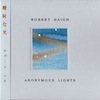 As enjoyable as Robert Haigh's albums have been, they never seemed to capture that same aching beauty of his classic albums from the '80s (both under his own name and as Sema). This latest album changes all that. The delicate touch and fragile melodies, which defined his best work, are both present. Sombre without being dour, reflective without being depressing, this represents Haigh's finest work in years.
As enjoyable as Robert Haigh's albums have been, they never seemed to capture that same aching beauty of his classic albums from the '80s (both under his own name and as Sema). This latest album changes all that. The delicate touch and fragile melodies, which defined his best work, are both present. Sombre without being dour, reflective without being depressing, this represents Haigh's finest work in years.
The album begins sombrely with the title track; slow and nocturnal it sets the pace and the mood for the album. Like most of Anonymous Lights, this initial piece is short (only this and one other piece last longer than three minutes). Each tune is a vignette full of moonlight and dead calm. The influence of Erik Satie and Claude Debussy is obvious throughout but Haigh's unmistakable compositions could not be confused with scores from either composer. The likes of "Fugitive Moonlight" gently dances like light rain, as hypnotic as the natural sound but full of a supernatural magic and evoking the melodic powers of Satie and Debussy without aping their respective styles.
Elsewhere, "Berlin Kino" shows Haigh's superb ear for melody as he crafts a stunning constellation of notes over the pitch black of a repeating rhythm on the lower keys. The album's title and the starry quality of the notes both here and on pretty much every other piece on Anonymous Lights give the impression of being an observer, either a traveller gazing at a distant city or an astronomer casting their sight down the body of a telescope into the infinite heavens. This idea comes through strongest during "Moon Blue Crooks" which also incorporates the sound of a wind gusting through the music giving the feeling of in an old house, ear against the wall listening to a haunting (or haunted) piano as the weather beats the outside of the building.
At the end of Anonymous Lights is a lengthy piece, "Book of Fixed Stars," which evokes the same ghostly feelings as were present in the grooves of those old Sema records. Over the course of the piece, Haigh takes simple building blocks of melodic clusters and puts them together in cryptic, beautiful ways. The already slow pace of the album freezes and almost reaches a stop as Haigh lets each note form fully and ring; the reverberation blurring into the next note and creating a transfixing audio painting.
To call this music beautiful is an understatement. Blixa Bargeld once said that "arms would not be able to stretch as far as necessary
to form an adequate gesture for beauty." I like to think that Haigh has managed to form that gesture through his playing, stretching his arms along an infinite piano keyboard to create a true artistic representation of beauty at its purest.
samples:
Read More

